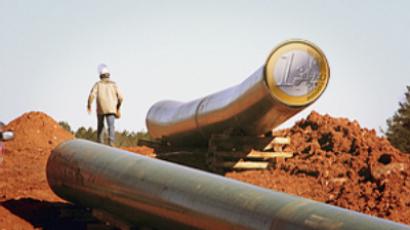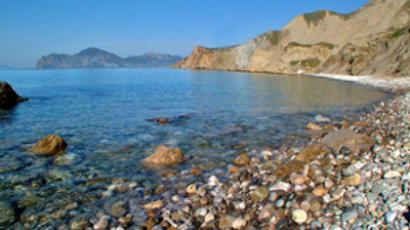Gazprom to take Ukraine to court
Russia's energy company Gazprom has increased the volume of gas being delivered to Europe. The company blames Ukraine for siphoning the transit gas and is filing a lawsuit against it in the European court.
This follows the cutoff of gas supplies to Ukraine on January 1, after the two countries’ gas companies failed to agree on a price for 2009.
Gazprom is now filing a lawsuit against Ukraine's Naftogaz claiming the firm violated its obligations as a transit party. Several countries, including Poland, Slovakia, Romania, Hungary and the Balkans, all say their supplies have dropped.
“Our European consumers in Hungary, Slovakia, Romania and Poland and in the Balkans are reporting unlicensed siphoning off of Russian gas on Ukrainian territory. In this situation Gazprom must provide additional volumes of gas through other gas transporting corridors,” said Gazprom CEO Aleksy Miller.
Ukraine denies any illegal action. It says any gas it is withholding is needed for transit to the west. Gazprom is now using alternative routes to get gas to European customers avoiding Ukraine.
“We've increased gas volumes going from Russia's Siberia to Europe via Russia's Yamal-Europe pipeline. We've also agreed with Turkey on increasing gas volumes going through the Blue Stream pipeline to the Balkans. The gas volumes coming from Russia to Poland through Belarus have also been increased,” says Gazprom’s Boris Posyagin.
Stockpiles of Russian gas in storage in Western Europe are also being used, but Gazprom says these measures are not enough.
“Ukraine is not only stealing our gas from the export pipes, but it is also using gas from our joint storages in Ukraine, that is the gas bound for export, for its own needs. It's too much, we cannot compensate shortages in full,” says Aleksandr Medvedev, Gazprom’s deputy CEO.
Moscow now says it can no longer depend on Ukraine as a transit route to Europe and is looking for other options. The alternatives are two new pipelines Russia is building to by-pass Ukraine. The South Stream would pass under the Black Sea and the Nord Stream would run under the Baltic Sea.
Aleksandr Medvedev is now in the Czech Republic, which is currently presiding over the European Union, to explain the company's position.
“We still cannot understand why the discounted price Gazprom offered Ukraine was rejected. We hope the Czech Republic can use its power as the country presiding in the EU to make Ukraine return to negotiations and to return with real offers,” says Medvedev.
Gazprom cut gas supplies to Ukraine on January 1 after Moscow and Kiev failed to agree on a price for 2009. Gazprom initially offered a discounted rate of $US 250 per 1,000 cubic metres. Ukraine rejected it as too expensive and Moscow now says it must pay a European market price of $US 418.
Gazprom says Ukraine has clocked up a massive debt. It promised to pay $US 1.5 billion, but that money won’t reach Gazprom’s accounts until after Russia’s winter holiday season: January 11.
In addition, Moscow says Kiev would still owe it $US 614 million more due to late payment fines. Meanwhile the company that acts as middleman between Russia’s Gazprom and Ukraine’s Naftogaz, RosUkrEnergo, says that Kiev’s failure to meet its transit obligations may be punished in court.
According to Hans Baumgartner, a representative of RosUkrEnergo’s Board of Directors, the company filed two claims against Ukraine to ensure gas transportation to Western Europe. Gazprom also plans to take legal action against Naftogaz.
A similar row between Russia and Ukraine at the beginning of 2006 disrupted supplies to Europe. Kiev later admitted it had siphoned off gas.
Kiev has yet to send a delegation back to Moscow to resume talks.














